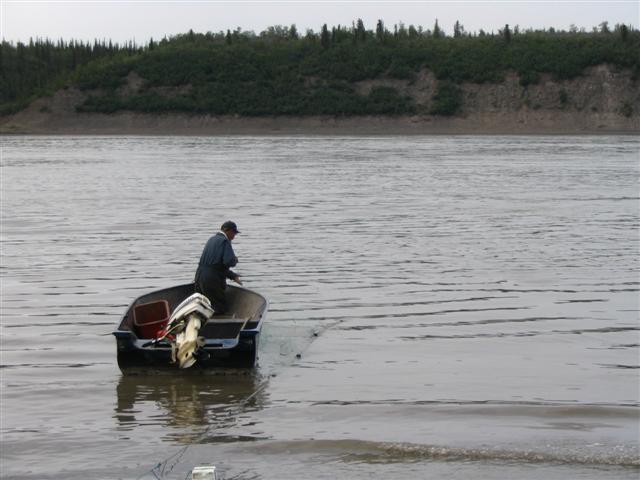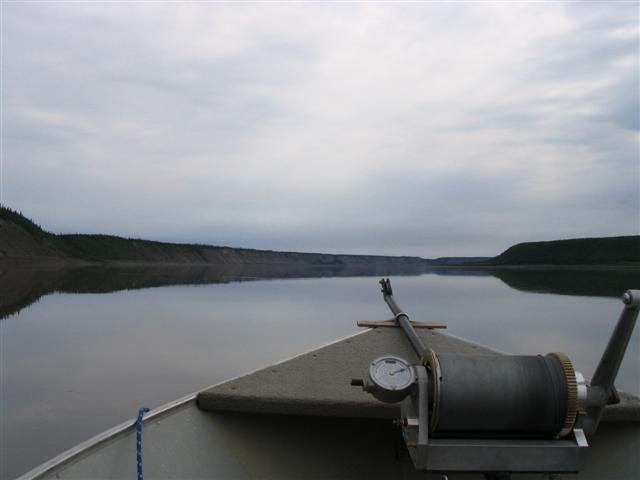( Log In ) Log In is for TREC Teachers & Researchers only
  |
| Amy_Clapp |
 Jun 30 2005, 03:53 PM Jun 30 2005, 03:53 PM
Post
#1
|
 TREC Teacher    Group: TREC Team Posts: 84 Joined: 27-April 05 Member No.: 6 |
Wow, we had a big day yesterday—we’ve gotten into a regular routine of Bart, Max and I meeting for breakfast and going to the Caribou Café. We each pretty much get the same thing every morning and then we are on our way. Today, that involved some logistical work (I feel that is all we have been doing since we got here, but that seems to be the case when doing science research, there are a lot of logistics that need to be taken care of before you can actually do the field research or else there are issues in the field that are difficult to take care of). Anyway, the logistics today included getting the boat hooked to the trailer, stopping by the grocery store to get food for lunch, and finding Les—the guy who was going to do the driving of the boat. All of that was done by 10:00 a.m. and we were on our way to Tsiigehtchic again. However, today we drove a lot slower because we had the boat in tow.
As I said in a previous post, the Dempster Highway, which we took from Inuvik to Tsiigehtchic (pronounced Sick-A-Chick) is all dirt. Well, we had some rain this morning, and the road was so muddy. Of course our truck was spitting all that mud onto the boat, and so the boat was a muddy mess by the time we arrived in Tsiigehtchic.  While we were preparing the boat to go in the water we noticed some fishing nets in the water. We were talking about those when all of a sudden a motorboat with an elder, Noah Andre, motored over to the net and started pulling fish up. He then came up to us and we asked him a bunch or questions about the fish. He said that this one was particularly big:  And also that he had placed the net out the night before. He caught about 25 fish and would continue to check the net for the rest of the day every two hours. He has a fish camp right on the edge of town which we are going to check out when we spend the day in Tsiigehtchic on Thursday. He pulls the fish out of with the net and than whaps them on the head with a stick and throws them in the boat.   He then takes the fish back to his fish camp and smokes them. We will check out the smoke house when we see him again on Thursday. So before we pushed off on the boat, I figured it would be a good idea to go to the bathroom, so I headed off into the bush—it is crazy how bad the mosquitoes are when you are in the bush compared to the side of the river. Believe me they are pretty bad by the side of the river, but in the bush, it is unbelievable. I must have had 500 mosquitoes swarming me, and you end up having to run away as fast as you can because no matter how fast you move your hands, you can’t keep them off you. The bummer is that they follow you, so as soon as I got back to the truck, I sprayed myself with bug juice and then things are better. Les, the driver of the boat has lived in Inuvik for a long time, and he says the mosquitoes come first and then in mid-July you add the no-see-ums and black flies, and then a little bit after that comes the horseflies. He says that in the height of the season (end of July) that it is not uncommon for people in town to walk around with netting around their face. Anyway, while in the bush, I found some interesting tracks (see Arctic Picture of the Day #2) to see if you can identify what I saw. Anyway, so we pushed off and headed down the Mackenzie River.  It took us about 10 minutes to get to the sampling site, which is marked by water resource markers on the shore. We pulled off onto shore and had a lunch, attached the D-96 to the nose and then headed out to sample.  First we went to the middle of the sample and dropped the bomb (D-96) and pulled it out. Yikes—the Teflon bag had a big hole in it—  luckily we had spares, so we put what we could from the first drop in the churn and then did another drop with a new bag. Success….  from that bag we filled up some of the sample bottles and poured the rest into the churn. Then we went to 4 other spots across the channel and dropped the bomb and put the samples into the churn. At each site we also took readings of the water such as temperature, pH, and depth. The bomb is a pretty amazing piece of equipment. What it does is that while it is being lowered and brought up it is collecting water from all different depths of the river. This allows the scientists to get a good idea of what the entire river water is like all the way across the river and all the way down too. What is neat is that it is designed to collect amounts of water equal to the amount of water flowing in a certain spot in the river. What I mean by that is in one spot where we sampled, we dropped the bomb, pulled it up, and it was only a quarter of the way full, compared to when we dropped it in a different (deeper) spot and it came up almost all the way full. Even though Bart was nervous about getting enough water in the churn to process, it is accurate that at the one station we didn’t get very much water because that station was not as deep and the current wasn’t going as fast—so if we are trying to get an accurate picture of the whole river we shouldn’t collect as much water from there as we did from the middle of the channel because there is a lot more water flowing through the middle of the channel. Anyway, we did some of the processing on the boat, although we try to do the least amount there because it is not as clean on the boat as we would like.  Then we packed everything up and headed back. We loaded the boat onto the trailer and then carefully moved all the sample water into the truck and headed back to Inuvik. I have to say I found a very cool rock while we were packing up. If there are any geologists out there who may be able to tell me more about the rock, I would love to hear about it. Les is pretty sure it is a sedimentary rock, but that is all the information I could get out of this scientific team.  It was a great day, and as we were driving back to Inuvik, we were talking about the day and what worked well and where some of the glitches are still and there was that good feeling that you feel sometimes when you work with a team. I know I used to have that feeling when I played soccer—the feeling of a bunch of people working together and getting something done. I realized today how you can get that feeling on a sports team, but that you can also get it on a science team, which makes working in a science team have a lot of appeal. Although, we were all only together for that one day working, you really get to know the people that you are working with, and when things go well, as they did today, it makes you feel happy and want to work with those people again—it is a good energy that comes out of work like that—and maybe a part of working on a scientific team that not many people think about—a definite perk in my book and part of the reason I enjoy doing this so much!!! Over and out until I get some time to write about the processing!!! We're off to Tsiigehtchic to meet the community... Amy |
  |
2 User(s) are reading this topic (2 Guests and 0 Anonymous Users)
0 Members:

|
NSF Acknowledgment & Disclaimer | Time is now: 18th November 2024 - 08:04 AM |
Invision Power Board
v2.1.7 © 2024 IPS, Inc.








